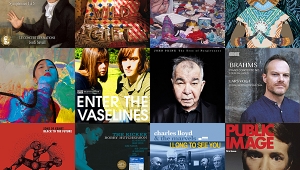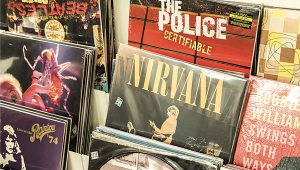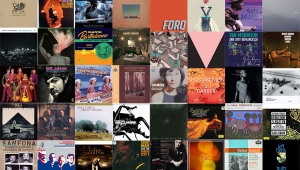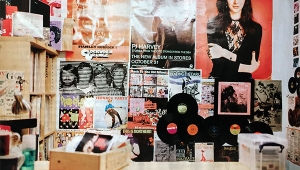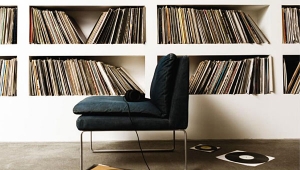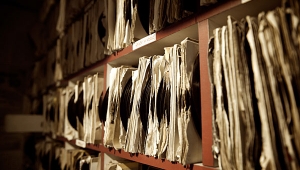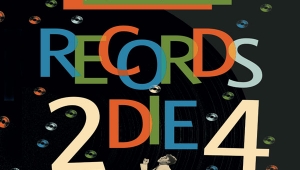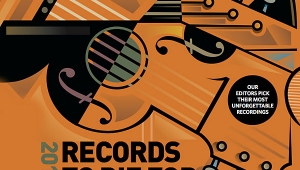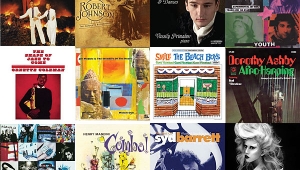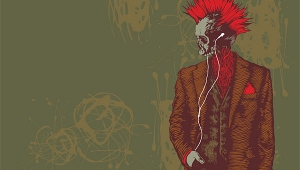| Columns Retired Columns & Blogs |
1997 Records To Die For Page 5
Robert Deutsch
RAGTIME: The Musical
Music by Stephen Flaherty. Lyrics by Lynn Ahrens. 1996 Toronto Cast. Ted Sperling, cond.
RCA Victor 68629-2 (CD only). 1996. Jay David Saks, prod.; James P. Nichols, eng. DDD. TT: 62:07
In my full review of Ragtime, I called it my personal Recording of the Year, so I'd be less than consistent if I didn't also choose it as one of this year's R2D4s. The fact is, I still find Ragtime an exciting and at times profoundly moving work. Despite having listened to the CD at least a dozen times, I'm apt to find tears coming to my eyes during the reprise of "Wheels of a Dream" in the finale. Great performances from the large cast, and the recording, while multimiked/multitracked, is unusually fine-sounding. If your CD buying budget for this year allows for only one show-music recording (pity!), make it Ragtime.
OFFENBACH: Les Contes d'Hoffman(The Tales of Hoffman)
Joan Sutherland, Stella, Olympia, Giulietta, Antonia; Plácido Domingo, Hoffman; Gabriel Bacquier, Lindorf, Coppélius, Departutto, Dr. Miracle; Huguette Tourangeau, La Muse, Nicklausse. Choruses: Radio de la Suisse Romande, Pro Arte de Lausanne, du Brassus; André Charlet, chorus master; L'Orchestre de la Suisse Romande, Richard Bonynge
London OSA-13106 (3 LPs, nla), 417 363-2 (2 CDs). 1972/1986. John Mordler, prod.; James Lock, Colin Moorfoot, engs. AAA/ADD. TT: 2:21:26
Les Contes d'Hoffman has had a number of recordings, but, for me, none has eclipsed the 1972 Decca/London set. It conforms to the interpretation that Olympia, Antonia, and Giulietta are different facets of Stella, and thus should be sung by the same soprano, and that the same baritone should sing the four villains. The soprano roles have sufficiently different vocal requirements that it would take, say, a Joan Sutherland to do justice to them all. Of course, the recording does have Sutherland, and she sounds simply glorious. Domingo, too, is at the top of his form, and Gabriel Bacquier makes a powerful impression as the villains. Bonynge maintains the musical and dramatic thrust of the piece, and sound quality is up to the best from Decca/London's Golden Age of Analog. The CD transfer is pretty good, but, as followers of Michael Fremer's column won't be surprised to learn, the LPs sound better. (XVI-2)

Shannon Dickson
DOUG MacLEOD: Come to Find
Doug MacLeod, acoustic guitar, vocals; Charlie Musselwhite, harmonica; Bill Stuve, acoustic bass; Jimi Bott, drums; Black Cherry, backup vocals
AudioQuest Music AQ-1027 (LP), AQ-CD1027 (CD only). 1995. Joe Harley, prod.; Michael C. Ross, eng. AAA/AAD. TT: 52:27
Come to Find is the first of what I hope is to be a continuing series of outstanding albums pairing producer Joe Harley of AudioQuest Music with Doug MacLeod's special gift for the blues (the second record from this series, You Can't Take My Blues, was released last year and could just as easily have been my choice.) All but two of the 11 songs here were penned by MacLeod---and there's not a weak number among them. With cuts like "Master's Plan," "Lost Something This Morning," Willie Dixon's "Bring It On Home," or the title cut, it's hard to go wrong. My favorite seems to be whichever one I'm listening to at the moment.
SHOSTAKOVICH: Cello Concerto 1, Piano Concerto 1
William DeRosa, cello; Valentina Lisitsa, piano; Sarah Caldwell, Ekatherinburg Philharmonic Orchestra
Audiofon CD-72060 (CD only). 1996. Julian H. Kreeger prod.; Peter McGrath, eng. TT: 52:46
I must admit that, with the exception of a few pieces, Shostakovich has never been among my favorite composers. These two concertos, played with consummate virtuosity and gorgeously captured in one of the best examples I've heard of Peter McGrath's mimimalist recording technique, now join the select few of the late Russian composer's works that I truly admire. Mr. DeRosa's renowned skill on the cello is in full display here, as is the remarkable talent of young Russian pianist Valentina Lisitsa, whose rendition of Schnittke's Gogol Suites, also captured by McGrath and Audiofon (CD-72054), knocked me out during an audition of Audio Artistry's new Beethoven speaker at last year's CES.
BRAHMS: Piano Trio, Op.8; Piano Quartet, Op.60
Arthur Delmoni, violin; Marcus Thompson, viola; Ronald Thomas, cello; Christopher O'Riley (Op.8), Mihae Lee (Op.60), piano
Northeastern NR-244 (CD only). 1990. Ronald Thomas, prod.; John Newton, eng. DDD. TT: 70:43
The more I listen to this CD, the more I'm struck by the stylish musicality of the playing and the exceptional naturalness of the engineering, the latter suggesting a relatively forward seat in a moderate-size hall. Captured in wide dynamic range with balances carefully gauged to avoid (as sometimes happens) the swamping of the strings by the piano, the playing is animated yet unhurried. Expression is achieved not through arbitrary fussiness, but from biting attacks, long, soaring lines, and a rhythmic elasticity that never violates a basic pulse or structural integrity. Many celebrated names have recorded this repertory, but none that I know has ever done it greater justice than is done here. (XVII-3)
SCHUBERT: The Late Piano Sonatas
Sonatas D.958, 959, 960; Allegretto, D.915; Three Piano Pieces, D.946
Maurizio Pollini, piano
DG 419 229-2 (2 CDs only). 1987. Rainer Brock, prod.; Gunter Hermanns, eng. DDD. TT: 2:20:41
These are among the most satisfying recordings in the piano literature, projecting the wide emotional range and stark originality of this haunting repertory. Purging the music of even a hint of the sentimentality sometimes imposed on it, Pollini offers aptly craggy, tensile readings that suggest the influence of Beethoven on Schubert while conveying as well the ethereal delicacy that reflects Schubert's debt to Mozart. Nothing is exaggerated or understated in these flexible yet tautly unified performances, and Pollini's tone (which in some recordings has seemed thin and brittle) here has a more rounded, less percussive sonority that complements the music perfectly, and is captured in a relatively close perspective that is intimate without becoming claustrophobic. (XII-3)

RAGTIME: The Musical
Music by Stephen Flaherty. Lyrics by Lynn Ahrens. 1996 Toronto Cast. Ted Sperling, cond.
RCA Victor 68629-2 (CD only). 1996. Jay David Saks, prod.; James P. Nichols, eng. DDD. TT: 62:07
In my full review of Ragtime, I called it my personal Recording of the Year, so I'd be less than consistent if I didn't also choose it as one of this year's R2D4s. The fact is, I still find Ragtime an exciting and at times profoundly moving work. Despite having listened to the CD at least a dozen times, I'm apt to find tears coming to my eyes during the reprise of "Wheels of a Dream" in the finale. Great performances from the large cast, and the recording, while multimiked/multitracked, is unusually fine-sounding. If your CD buying budget for this year allows for only one show-music recording (pity!), make it Ragtime.
OFFENBACH: Les Contes d'Hoffman(The Tales of Hoffman)
Joan Sutherland, Stella, Olympia, Giulietta, Antonia; Plácido Domingo, Hoffman; Gabriel Bacquier, Lindorf, Coppélius, Departutto, Dr. Miracle; Huguette Tourangeau, La Muse, Nicklausse. Choruses: Radio de la Suisse Romande, Pro Arte de Lausanne, du Brassus; André Charlet, chorus master; L'Orchestre de la Suisse Romande, Richard Bonynge
London OSA-13106 (3 LPs, nla), 417 363-2 (2 CDs). 1972/1986. John Mordler, prod.; James Lock, Colin Moorfoot, engs. AAA/ADD. TT: 2:21:26
Les Contes d'Hoffman has had a number of recordings, but, for me, none has eclipsed the 1972 Decca/London set. It conforms to the interpretation that Olympia, Antonia, and Giulietta are different facets of Stella, and thus should be sung by the same soprano, and that the same baritone should sing the four villains. The soprano roles have sufficiently different vocal requirements that it would take, say, a Joan Sutherland to do justice to them all. Of course, the recording does have Sutherland, and she sounds simply glorious. Domingo, too, is at the top of his form, and Gabriel Bacquier makes a powerful impression as the villains. Bonynge maintains the musical and dramatic thrust of the piece, and sound quality is up to the best from Decca/London's Golden Age of Analog. The CD transfer is pretty good, but, as followers of Michael Fremer's column won't be surprised to learn, the LPs sound better. (XVI-2)
Shannon Dickson
DOUG MacLEOD: Come to Find
Doug MacLeod, acoustic guitar, vocals; Charlie Musselwhite, harmonica; Bill Stuve, acoustic bass; Jimi Bott, drums; Black Cherry, backup vocals
AudioQuest Music AQ-1027 (LP), AQ-CD1027 (CD only). 1995. Joe Harley, prod.; Michael C. Ross, eng. AAA/AAD. TT: 52:27
Come to Find is the first of what I hope is to be a continuing series of outstanding albums pairing producer Joe Harley of AudioQuest Music with Doug MacLeod's special gift for the blues (the second record from this series, You Can't Take My Blues, was released last year and could just as easily have been my choice.) All but two of the 11 songs here were penned by MacLeod---and there's not a weak number among them. With cuts like "Master's Plan," "Lost Something This Morning," Willie Dixon's "Bring It On Home," or the title cut, it's hard to go wrong. My favorite seems to be whichever one I'm listening to at the moment.
The project was recorded live, direct to two-track, in two days of January 1994 at Ocean Way Recording under the steady hand of Michael C. Ross, followed with mastering by Bernie Grundman. The LP portion of the project received the best of care, the late Ed Tobin handling the plating chores, and pressing by RTI. Not surprisingly, the sonics are spectacular---"audiophile" music at its best, and a record I wouldn't be without. (XVIII-6)
SHOSTAKOVICH: Cello Concerto 1, Piano Concerto 1
William DeRosa, cello; Valentina Lisitsa, piano; Sarah Caldwell, Ekatherinburg Philharmonic Orchestra
Audiofon CD-72060 (CD only). 1996. Julian H. Kreeger prod.; Peter McGrath, eng. TT: 52:46
I must admit that, with the exception of a few pieces, Shostakovich has never been among my favorite composers. These two concertos, played with consummate virtuosity and gorgeously captured in one of the best examples I've heard of Peter McGrath's mimimalist recording technique, now join the select few of the late Russian composer's works that I truly admire. Mr. DeRosa's renowned skill on the cello is in full display here, as is the remarkable talent of young Russian pianist Valentina Lisitsa, whose rendition of Schnittke's Gogol Suites, also captured by McGrath and Audiofon (CD-72054), knocked me out during an audition of Audio Artistry's new Beethoven speaker at last year's CES.
The Ekatherinburg Philharmonic is one of those outstanding Russian orchestras long closed off to the outside world (the group hails from Boris Yeltsin's hometown). Sarah Caldwell, artistic director of the Opera Company of Boston, here shows off the close relationship she's developed with this orchestra in recent years.
The natural perspective, realistic dynamic range, and musical clarity on this recording are simply superb. Listen to the beautiful tonal character of the massed strings (a sore point with so many classical recordings), and the incredible dynamic interplay between Ms. Lisitsa's firey piano and the horns during the latter part of the piano concerto. This CD, combined with the earlier Lisitsa recordings by Audiofon, prove that McGrath really knows how to capture a piano!
No noise reduction, limiting, or signal processing were used in the mastering process, and while such purist steps don't always work out as planned, they do so here. This is a recording that really demonstrates the refined virtues of a high-resolution playback system. ![]()
Mortimer H. Frank
BRAHMS: Piano Trio, Op.8; Piano Quartet, Op.60
Arthur Delmoni, violin; Marcus Thompson, viola; Ronald Thomas, cello; Christopher O'Riley (Op.8), Mihae Lee (Op.60), piano
Northeastern NR-244 (CD only). 1990. Ronald Thomas, prod.; John Newton, eng. DDD. TT: 70:43
The more I listen to this CD, the more I'm struck by the stylish musicality of the playing and the exceptional naturalness of the engineering, the latter suggesting a relatively forward seat in a moderate-size hall. Captured in wide dynamic range with balances carefully gauged to avoid (as sometimes happens) the swamping of the strings by the piano, the playing is animated yet unhurried. Expression is achieved not through arbitrary fussiness, but from biting attacks, long, soaring lines, and a rhythmic elasticity that never violates a basic pulse or structural integrity. Many celebrated names have recorded this repertory, but none that I know has ever done it greater justice than is done here. (XVII-3)
SCHUBERT: The Late Piano Sonatas
Sonatas D.958, 959, 960; Allegretto, D.915; Three Piano Pieces, D.946
Maurizio Pollini, piano
DG 419 229-2 (2 CDs only). 1987. Rainer Brock, prod.; Gunter Hermanns, eng. DDD. TT: 2:20:41
These are among the most satisfying recordings in the piano literature, projecting the wide emotional range and stark originality of this haunting repertory. Purging the music of even a hint of the sentimentality sometimes imposed on it, Pollini offers aptly craggy, tensile readings that suggest the influence of Beethoven on Schubert while conveying as well the ethereal delicacy that reflects Schubert's debt to Mozart. Nothing is exaggerated or understated in these flexible yet tautly unified performances, and Pollini's tone (which in some recordings has seemed thin and brittle) here has a more rounded, less percussive sonority that complements the music perfectly, and is captured in a relatively close perspective that is intimate without becoming claustrophobic. (XII-3)
- Log in or register to post comments

